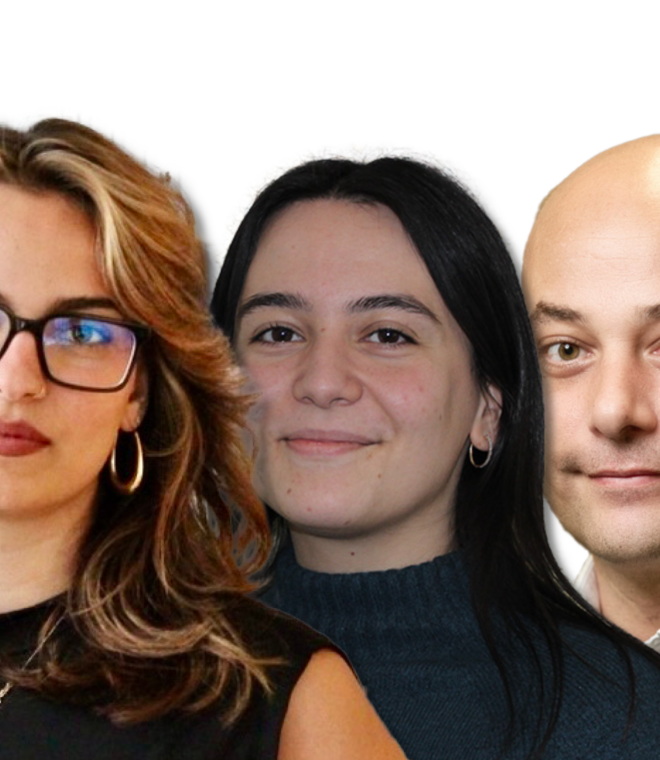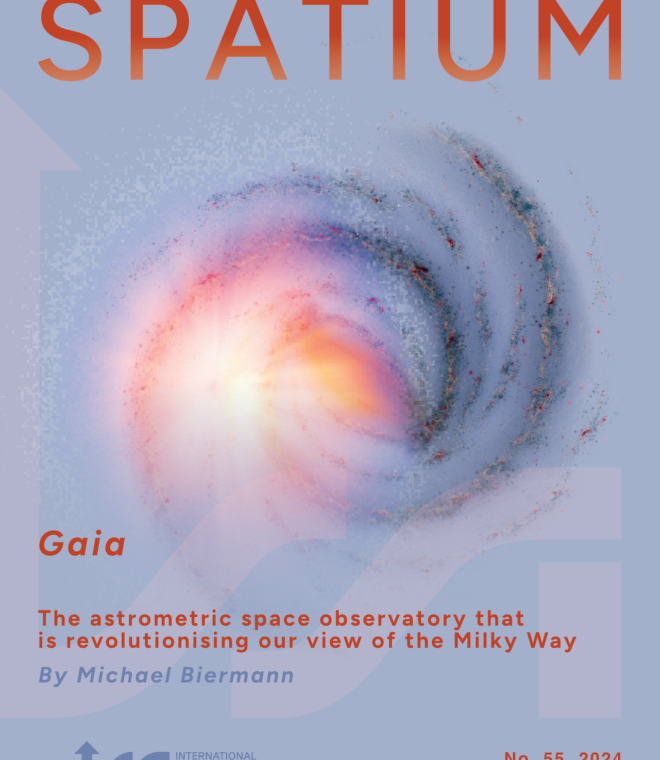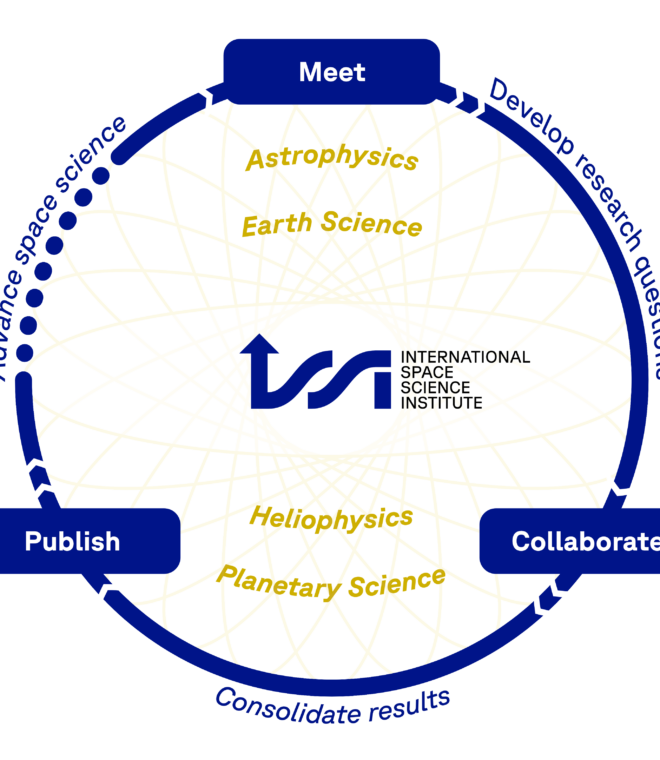In many respects, 2024 has been a transformational year.
The effects of the pandemic hiatus are finally behind us. ISSI had fully caught up the scheduling backlog, and could finally resume a steady state of activities, and start thinking about the future, and what the future could be for a unique organization like ISSI. During the pandemic, communication within the scien- tific community had totally changed: meeting on-line was the only way to do work and keep the commu- nities connected. But as soon as in-person meetings could resume, the enthusiastic response of the scientific community was to be at ISSI again, in person, to discuss science.
Cosmic Footprint, large Scale Space Ethics (8–10 January 2024)
The Economics and Law of Space-Based Commerce (WTI-ISSI Special Conference | 17–18 January 2024)
Coastal Blue Carbon from Space (15–17 May 2024)
International Cooperation in Space to Advance Science (4–6 June 2024)
Using Earth Observation Systems to Improve Climate Adaptation Policy and Action (25–28 June 2024)
22–26 January 2024
Physical Links Between Weather and Climate in Space and the Lower Atmosphere
This workshop will support a deeper understanding of the solar and terrestrial interactions through energy and momentum transfer processes between the ionosphere and the upper- and middle atmosphere, thus possibly enabling the detection of signatures by natural and anthropogenic hazards….
Main Convener(s)
M. Rast
_______________________
11–15 March 2024
The Chronology of the Very Early Universe According to JWST: The First Billion Years
This is the first in the new series of Breakthrough Workshops that we are starting at ISSI. Breakthrough Workshops are designed to address one key question in science, by gathering the main experts on the topic, invite them to spend a week in a neutral and welcoming environment, discuss the issues, and produce one high…
Main Convener(s)
A. Nota and P. Oesch
_______________________
8–12 April 2024
The Geoscience of Exoplanets: Going Beyond Habitability
The Workshop will cover a wide range of topics, bringing exoplanet observers and modellers, astrophysicists, planetary scientists, astrobiologists and Earth scientist together to learn about Earth-sized rocky planets in general and discuss the chances of finding extraterrestrial life and strategies of how to best detec…
Main Convener(s)
A. Giménez , T. Spohn, R. Nakamura
__________________________________
22–26 April 2024
Electron Kinetic Physics: The Next Frontier in Space and Astrophysical Plasmas
This Workshop explores key science questions in the interdisciplinary field of electron-astrophysics. This emerging field studies the fundamental plasma processes in the electron-kinetic regime and their impact on the global dynamics and thermodynamics of space and astrophysical plasmas.
Main Convener(s)
D. Verscharen, T. Dudok de Wit
___________________________________
17–21 June 2024
Accretion Disks: The First 50 Years
The Workshop covered the current standing of the accretion disk paradigm, a historical review of progress of our understanding of the engine powering accretion, an overview of observational discoveries shedding light on the accretion geometry, as well as a discussion of possible future directions….
Main Convener(s)
A. Veledina, M. Falanga
____________________________________
22–26 July 2024
Exocomets: Bridging our Understanding of Minor Bodies in Solar and Exoplanetary Systems
The main goal is to bring together researchers working on exocomets, relevant areas of exoplanetary research and protoplanetary disks, as well as Solar System comet researchers. It will provide a forum to discuss recent progress in exocomet research, transfer knowledge between fields and prepare for the utilization of …
Main Convener(s)
G. Jones
24-599 • Abalos M. (ES)
24-600 • Bahé Y. (CH) & Noble A. (US)
24-601 • Barczynski K. (CH)
24-602 • Belli S. (IT) & Davies R. (AUS)
24-603 • Bhardwaj A. (IN)
24-604 • Jie C. (CN) & Erdelyi R. (UK)
24-605 • Chifu I. (DE) & Madjarska M. (KR/DE/BG)
24-606 • Chintzoglou G. & Török T. (US)
24-607 • de Souza e Almeida Silva S. & Fedun V. (UK)
24-608 • Effenberger F. (DE) & Engelbrecht E. (SA)
24-609 • Ganjushkina N. (FI) & Liemohn M. (US)
24-610 • Haggard D. (CA) & von Fellenberg S. (DE)
24-611 • Hwang K. (US)
24-612 • Klein K. (US)
24-613 • Kornbleuth M. (US)
24-614 • Lanabere V. (SE)
24-616 • Morrissey L. (CA) & Verkercke S. (FR)
24-617 • Marschall R. (FR)
24-618 • Milligan R. (UK) & Harra L. (CH)
24-619 • Ming A. (UK) & Orbe C. (US)
24-620 • Plöger F. & Rolf C. (DE)
24-621 • Rodighiero G. & Gruppioni C. (IT)
24-622 • Samsonov A. (UK) & Amerstorfer U. (AT)
24-623 • Sandells M. (UK) & Mätzler C. (CH)
24-624 • Scarlata C. (US) & Hayes M. (SE)
24-625 • Thomas G. (ES)
24-626 • Thomas S. (FR) & Yardley S. (UK)
24-627 • Volwerk M. (AT)
24-628 • Wang D. (DE) & Yue C. (CN)
24-629 • Zaqarashvili T. (AT)
Sudip Bhattacharyya, TIFR Mumbai, India, working period: 24.6.-12.7.2024
Eric Gaidos, University of Hawaii, Mãnoa, Honolulu, working period: 20.5.-10.6.2024
Duncan Galloway, Monash University, Melbourne, Australia, working period: 10.11-1.12.2024
Gozaliasl Ghassem, University of Finland, Finland, working period: 3.-24.8.2024
Octavio Guilera, Universidad Nacional de La Plata, La Plata, Argentina, working period: 17.2.-27.3.2024
Peter Hoppe, Max-Planck-Institut für Chemie, Mainz, Germany, working period: 29.4.-8.5.2024
Raluca Ilie, University of Illinois, USA, working period: 10.-30.11.2024
Immanuel Jebaraj, University of Turku, Finland, working period: 1.7.–10.8.2024
Vladimir Krasnosselskikh, working period: 30.6.–6.4.2024
Sarah Leslie, Leiden University, Belgium, working period: 28.4.- 9.5.2024
Zhaosheng Li, working period: 24.-30.11.2024
Charles Lineweaver, Australian National University, working period: 5.-20.4.2024
Michael Mayer, Johannes Geiss Fellow 2024, working period: 24.6.-24.7.2024
Yuri Skorov, MPS/TU Braunschweig, Germany, working period : tbc
René Šprňa, Institute of Physics, Silesian University in Opava, Czech Republic, working period: 29.9.–2.10.2024
Ilya Usoskin, University of Oulu, Finland, working periods: 20.5.–16.6.2024
Peter Zeidler, Space Telescope Science Institute, USA, working period: 8.-18.9.2024
Michael R. Meyer has been a Professor of Astronomy at the University of Michigan since 2016. He was Chair of Star and Planet Formation at the ETH in Zürich (2009-2016) and was formerly a Professor/Astronomer at the Department of Astronomy/Steward Observatory of the University of Arizona (2000-2009). He was a Hubble Fellow at the University of Arizona (1997-2000) and did a post-doc at the Max-Planck-Institute for Astronomie (1995-1997). Prof. Meyer is a world recognized expert in the formation, evolution, and characterisation of planetary systems, and associated implications on the prospects for life in the Universe. He has also been deeply involved in the development of ground- and space-based instrumentation, including both the NIRCam and NIRISS instruments for the James Webb Space Telescope as well as high contrast imaging systems/spectrographs for 6-10 meter telescopes and next generation extremely large telescopes. Prof. Meyer will visit ISSI in the summer of 2024.
On the science side, we put emphasis on highlighting compelling and emerging science topics. In 2023, we hosted a wide variety of successful workshops and fora in the four disciplines that ISSI covers. Also in 2023, prepa- rations started for the first Breakthrough WS. This would be a new format for ISSI and was considered an exper- iment. Breakthrough WS focus on a very specific ques- tion that is ripe for discussion, because of new obser- vational data or theoretical or modelling developments.
ISSI has continued its series of webinar talks that have become known as the Game Changers Online Seminars with speakers from all over the world. The webinars were recorded and are available at www.issibern.ch where upcoming talks are also advertised. Between roughly 100 and 400 participants have attended the live webinars, many as loyal participants throughout the series. Read More >>
The Association Pro ISSI supports the International Space Science Institute (ISSI) in Bern by means of public relations activities in Switzerland for space research in general and for ISSI specifically by organising events for its members.
Scientists visit ISSI in 2024
Visited ISSI for the first time

The effects of the pandemic hiatus are finally behind us. By the end of 2023, ISSI had fully caught up the sched- uling backlog, and could finally resume a steady state of activities, and start thinking about the future, and what the future could be for a unique organization like ISSI. During the pandemic, communication within the scien- tific community had totally changed: meeting on-line was the only way to do work and keep the commu- nities connected. But as soon as in-person meetings could resume, the enthusiastic response of the scientific community was to be at ISSI again, in person, to discuss science.


Editorial from BOT President
